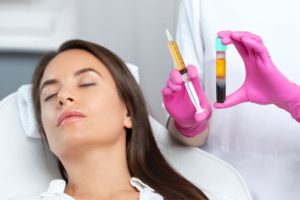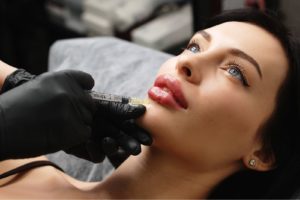If you think breakouts stop just because you’re out of your teenage years, they don’t. Many adults experience hormonally induced breakouts that cause inflamed cyst- and nodule-like pimples on the skin. While nodular acne, as it’s more commonly referred to, tends to occur more in those who experienced acne as teenagers, anyone is fair game. But just because you face nodular acne doesn’t mean you must deal with it. Plenty of effective treatments help lessen the effects of nodular acne and put the skin back on the path to clear.
Nodular acne is a painful, hormonally-related type of acne that affects men and women of all ages and skin tones. While these blemishes may appear to pop up overnight, they take weeks to come to fruition. Often in adults, acne signifies a hormonal imbalance, elevated stress levels, a poor diet, or a build of dead skin cells with over productive oil glands. Although nodular acne can be challenging to treat, there are solutions to diminish it and prevent it from recurring. However, consistency in at-home skincare and professional treatments is the key to keeping the skin clear for the long term.
What is nodular acne?
No matter the type of acne, it all forms for the same reason: a mix of oil, dead skin cells, and acne-causing bacteria get trapped deep within the pore. Once this combination festers in the pore long enough, inflammation and blemishes occur.
Not all breakouts are the same. When an abundance of acne-causing bacteria (p.acne) causes the mixture of acne-causing elements to become infected, nodular acne often forms. These deep, painful pimples extend far beneath the skin’s surface, causing the surface of the skin to become red, swollen, and inflamed.
Nodular acne is the most severe type of acne. Sometimes, the lesions come to a head, but other times they do not. Nodular acne doesn’t typically respond to over-the-counter topical products. The only way to clear it up is by devising a multi-prong skincare plan with the help of a professional.
Is nodular acne the same thing as cystic acne?
Nodular acne and cystic acne are similar but not the same. Both types of acne are severe and can be painful. However, there is a slight difference between the two classes of acne, both from deep, painful lesions under the skin that show on the surface.
Cystic acne tends to be redder and appears like a large boil filled with pus, sometimes with a head. On the other hand, nodular acne consists of deep nodule-like bumps that also form under the skin but without the symptoms of redness or a head on the tip of the pimple. Nodular acne can be flesh-toned, and the contents inside the pimple tend to feel stiff and unable to be extracted manually.
Why does nodular acne form?
There are a handful of acne triggers that cause nodular acne bumps to form. While knowing which ones may be responsible for nodular acne is difficult, any physical changes or identifiable skin symptoms will help make a proper diagnosis easier. Often, the causes of adult acne are similar to teenage acne but with a few different triggers that cause deeper, more painful pimples to form.
- Hormones: Elevated hormone levels are the biggest culprit of nodular acne. You may notice more than average amounts of deeper, more stubborn breakouts around your period and during pregnancy, pre-menopause, and menopause. As hormone levels spike and decrease, their teetering levels can cause a slower production of certain hormones, such as progesterone, that help keep the skin clear. Hormonal changes can also cause oil production spikes, a primary cause of acne in the first place.
- Excess oil: No matter your age, overactive sebum glands will cause the skin to pump out more-than-normal amounts of oil. When this sticky oil gets stuck within the pores and mixes with dead skin cells and acne bacteria, it can instigate nodular acne.
- Stress: Elevated stress levels are known to increase cortisol (the stress hormone) levels, which sends oil production into overdrive. As a result, constant pressure leaves an imbalance of hormones, resulting in nodular acne.
- Diet: A poor diet consisting of pro-inflammatory foods can cause inflammation, another driver of nodular acne.
In addition to the common causes of nodular acne, some medications can also cause it.
How do you get rid of acne nodules?
Treating acne nodules takes time, dedication, and patience. The good thing is that there are solutions to effectively improve the look of nodular acne, which tends to occur most frequently in the cheeks, jawline, chin, back, shoulders, and chest.
One of the newest and most innovative anti-acne treatments is AviClear. This light-based laser acne treatment is the only one of its kind. It uses a revolutionary 1726 nm wavelength suitable for treating all skin types and tones by targeting and suppressing sebum production. As a result, the skin produces less oil which helps to improve acne.
Unlike traditional acne treatments, which can take months or years to show signs of improvement, AviClear goes to work fast. The FDA-approved treatment is effective for all types of acne, including nodular acne. Sebum production is reduced in just three 30-minute sessions to help clear up current breakouts and prevent new ones from forming. In addition, AviClear works with topical products, so there’s no need to interrupt or stop what you have been using.
Does nodular acne go away?
Some types of acne will improve with time, and some may not. Nodular acne is stubborn and can linger on the skin for weeks, if not months or longer, without any treatment. Inside the lesion is a hard, compact mix of pus that has no way of draining itself. That’s why nodular acne often requires a proven treatment, like AviClear, to improve the skin.
Untreated nodular acne may cause scarring, be it deep, indented physical scars or skin discoloration.
Is nodular acne painful?
Some patients may associate nodular acne with pain and tenderness, while others may not have the same experience. Because the contents of the acne lesion are so deeply rooted within the pore, there’s usually a buildup of pressure within the skin, causing some pain and tenderness at the site. Also, nodular acne can throb or feel like it has a heartbeat, which is an indication of extreme inflammation within the skin.
Can nodular acne cause scarring?
All types of acne can lead to scarring, but nodular acne is the most offensive. This type of acne is strongly associated with inflammation deep within the skin. Leaving nodular acne to fend for itself can cause scarring that may be impossible to improve.
If you’re dealing with nodular acne, the most important thing to do is leave the skin alone. Picking and trying to pop these hard bumps will only further push their contents deeper within the pore, causing the acne lesion to worsen and take even longer to heal. Plus, the pressure on the pimple will likely cause post-inflammatory hyperpigmentation.
Not treating nodular acne with a treatment like AviClear can also damage the surrounding skin causing the infection to spread. While different types of scars may result from untreated nodular acne, dark spots that form are more manageable to lighten than permanent indented scars.









